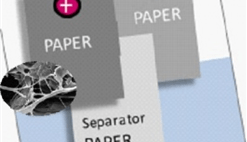All-Paper Li-Ion Battery
on

Researchers at the Laboratory of Pulp and Paper Science and Graphic Arts (LGP2) in Grenoble, France, in collaboration with the Polytechnic University of Torino, have developed a new paper-based Li-ion battery with paper electrodes instead of the usual polyester electrodes. The toxic solvent has also been eliminated, and the fluorinated binder has been replaced by cellulose fibres and microfibrils.
Using a simple filtration procedure with an aqueous medium, the fibres are destructured at the nanometre scale to form a three-dimensional network that provides mechanical strength as well as good contact with the conducting particles. The demonstration device is presently in the maturation phase with support from innovation sponsor Gravit, and the researchers are looking for industrial partners for further development and commercialisation.


Discussion (0 comments)